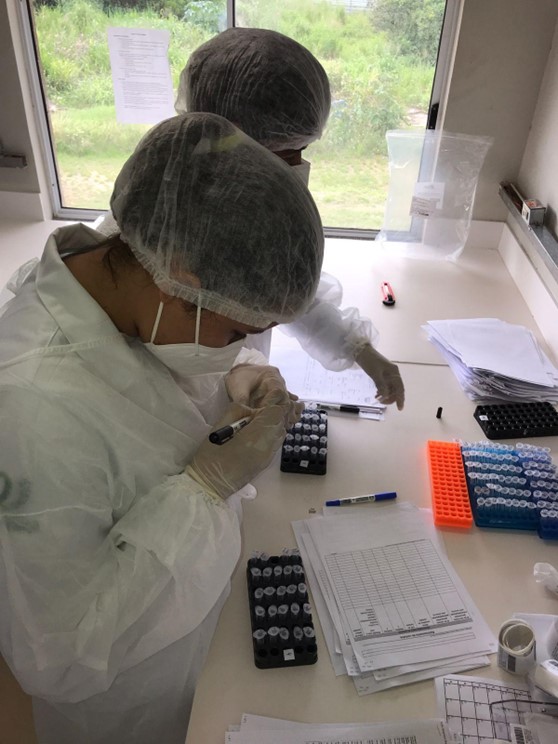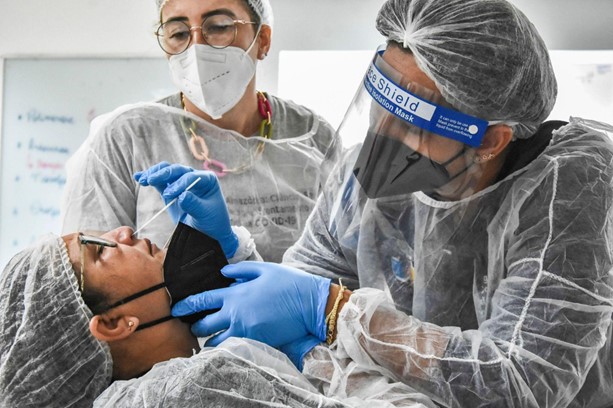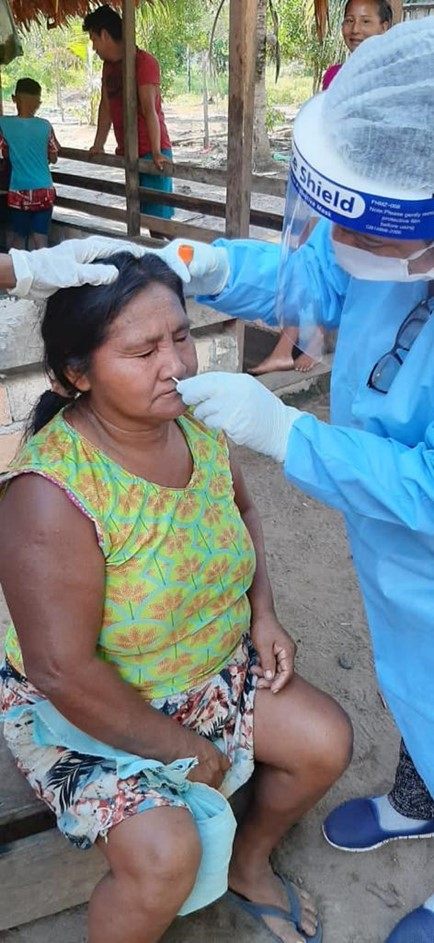Success Story
Promoting health surveillance in the Amazon: combating COVID-19 and preparing for future threats
February 1, 2024
Through the USAID-funded New Partnerships Initiative (NPI) EXPAND Brazil project, implementation partners worked to increase vaccination against COVID-19 in the Amazon region. In Brazil, NPI EXPAND supports projects dedicated to facing the COVID-19 pandemic and promoting the immunization of vulnerable and isolated communities. These projects show how collaboration among the public, private, and social sectors can encourage capacity strengthening, promote innovation, and improve essential public services, such as the Unified Health System (Sistema Único de Saúde (SUS)) in Brazil.
The COVID-19 pandemic has left a permanent mark on global history. While the true impact of this global health crisis is still being understood, one thing is certain: the speed of the health system’s response to this new virus was a crucial factor in combating the pandemic. Today, as the world reflects on the lessons learned and continues to fight the disease, an inevitable question persists: what would have been the impact of COVID-19 if the alert had sounded earlier? What if the world had been more vigilant?
Effective disease control plans require strengthening the capacity for health surveillance. The sooner threats are detected, the sooner control efforts can be mobilized.

Professionals working on COVID-19 testing at Labimol, in the West of Pará. Photo: Labimol
With funding from USAID, NPI EXPAND enhanced the response against COVID-19 in the Brazilian Amazon, one of the country’s most vulnerable regions, on various fronts. These include investments in laboratory equipment and supplies, as well as training professionals, which, during the crisis, were essential in detecting and controlling the transmission of the virus. Looking ahead, they will make the region more resilient to possible new threats.
The importance of staying vigilant
As the world optimistically receives the World Health Organization (WHO) announcement about ending COVID-19 as a public health emergency, various measures must not be relaxed as the disease continues to impact communities and health systems. Advancements in health surveillance are among the most crucial.
Virologist and public health researcher Felipe Naveca explains that a circulating virus will continue to evolve, highlighting the importance of monitoring: “Strengthening the surveillance system allows us to minimize the scale of the problem, as it enables early identification of a pathogen and alerts other regional, national, or international research authorities, thus leading to better control.”
On the other hand, the WHO announcement raises concerns regarding investments in the field. Marcos Prado, a biologist and PhD in genetics and molecular biology from the Molecular Biology Laboratory at the Federal University of West Pará (Labimol/Ufopa), acknowledges that there has been notable recognition of the value of health surveillance, but he emphasizes a critical issue – the uneven distribution of resources across regional healthcare centers.
“Investments in laboratory surveillance are more significant in major healthcare centers but have been largely inadequate in other regions, such as the West of Pará. Therefore, having a permanent policy through SUS (Brazilian Unified Health System) or the continuity of external partnerships is essential to sustain laboratory activities”, he points out.
Both experts are involved in projects that receive technical support from NPI EXPAND Brasil and financial assistance from USAID to combat and prevent the spread of COVID-19 in the Amazon region, one of the most complex and challenging areas in the fight against the pandemic.

Healthcare agents receive training to enhance patient care and testing capabilities. Photo: Ingrid Anne/Fiocruz Amazônia.
The relevance of the Amazon region
Researchers identify the Amazon region as one of the areas with the greatest potential for emerging new viruses. The proximity to the forest exposes the population to various types of microorganisms. Riverine communities, quilombolas, and indigenous people rely on the forest for food, leisure, and even employment, but contact with animals and vegetation can also pose health risks.
Furthermore, the population in the Brazilian Amazon states faces difficulty accessing healthcare due to long distances to major cities, a lack of qualified health professionals, and inadequate healthcare equipment and infrastructure.
“We may have cycles of disease transmission occurring unnoticed, especially in more isolated areas with limited access to healthcare services. Thus, pathogen surveillance in regions like the Amazon needs to be increasingly strengthened. We need to be attentive to the possibility of local outbreak response, local detection, and local identification”, explains Naveca.
To address this gap, Fiotec, one of NPI EXPAND’s grantees, launched an extensive effort to train health professionals working within the laboratories, aiming to strengthen genomic surveillance. The project “Amazônia: Ciência, Saúde e Solidariedade no Enfrentamento da Pandemia da COVID-19” (Amazon: Science, Health, and Solidarity in Confronting the COVID-19 Pandemic) built capacity for 23 professionals working in central and border laboratories in the states of Amazonas, Rondônia, Roraima, and Acre in the Brazilian North region. The participants took part in workshops with theoretical and practical classes on performing RT-PCR tests, inference, and genomic sequencing.

COVID-19 testing professionals visit quilombola, riverside, and indigenous communities to help protect isolated areas. Photo: Labimol
Prado works as the coordinator of Labimol, a laboratory that received crucial testing equipment through the partnership with the Projeto Saúde e Alegria (PSA) within the initiative “Ações Sinérgicas e Cooperativas de Mitigação do COVID-19 no Tapajós e Bacia do Xingu” (Synergistic and Cooperative Actions for Mitigating COVID-19 in the Tapajós and Xingu Basin). The donation of a real-time PCR thermocycler, received at the beginning of the year, currently keeps the laboratory operational.
Scientists use the PCR thermocycler to understand genes and study diseases better. This machine controls temperature very carefully to make these copies accurately. It’s also really important in finding diseases like COVID-19. By using the PCR thermocycler, scientists can create copies of the virus’s genetic material from a patient’s sample, helping them detect the virus and diagnose infections.
The testing unit is the only one in the Western Pará region. “The state of Pará is the only one in the country’s northern region with a testing laboratory maintained by the SUS outside the state capital. We have already conducted over 32,000 COVID-19 tests in the 20 municipalities we serve in the region,” he reports highlighting the importance of the research facility.
The PSA’s activities aim to support the local healthcare system by establishing telemedicine hubs, equipping Basic Health Units, and expanding molecular testing capacity (PCR).
Partnerships and cooperation can strengthen the implementing institutions, empowering them to become direct agents in supporting the public health system through different projects. The lasting results of these efforts, initially aimed at responding to the COVID-19 virus crisis, are the well-equipped laboratories and skilled professionals. These outcomes reinforce resilience against future emerging threats having a long-lasting impact.